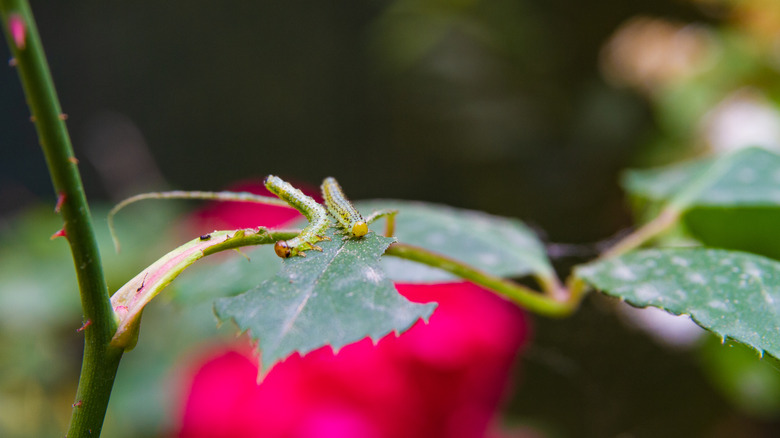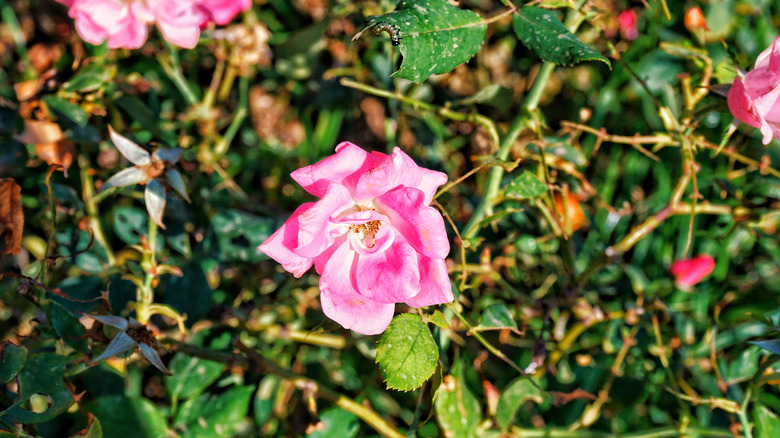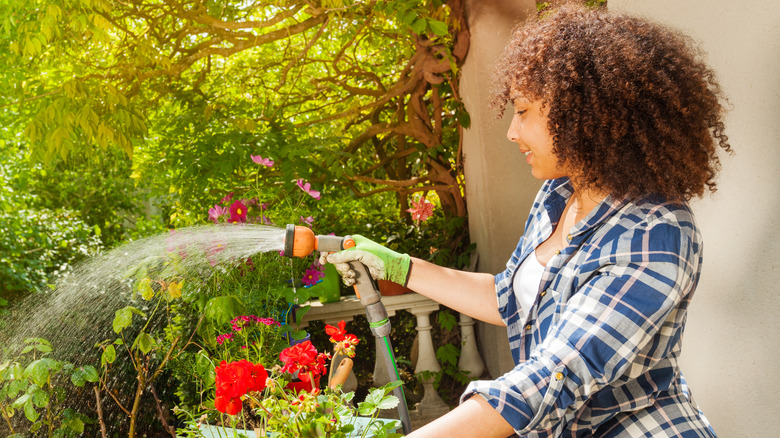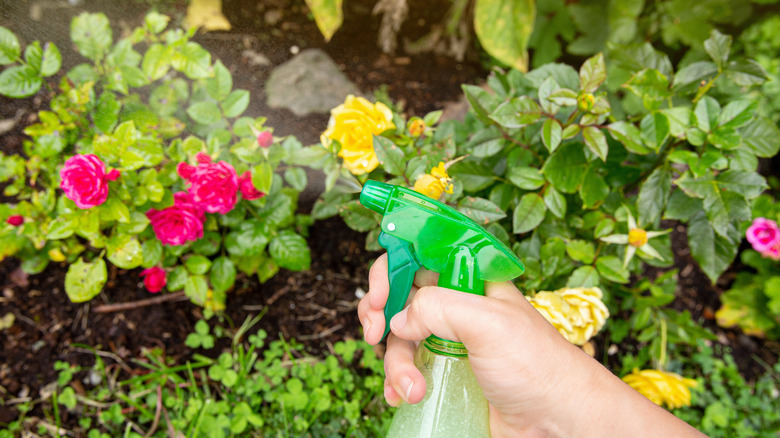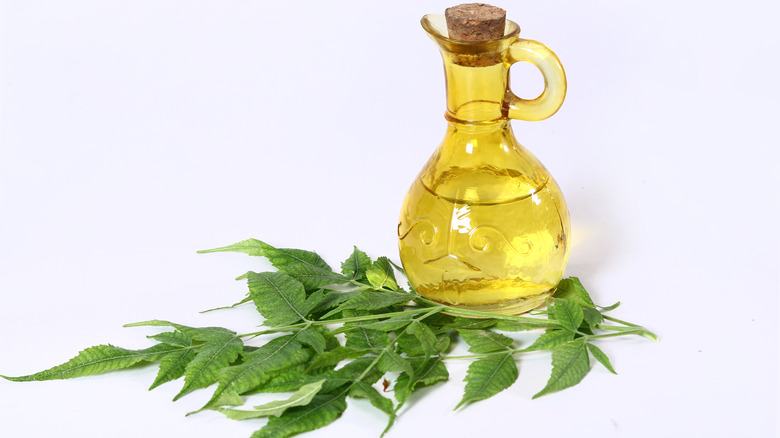8 Best Ways To Get Rid Of Green Worms On Roses
We may receive a commission on purchases made from links.
Just as we've worked magic on making our bathrooms more spa-like with how we fold our towels (trust us, it's game-changing), we've also turned to our gardens to reduce stress. According to Garden Gate, it turns out that tending to our perennials, annuals, and vegetable gardens can have a positive effect on mental health, immune system, and body; as the outlet points out, the activity can burn up to 300 calories in a single hour.
Will Wallace, who curates over 5,000 rose bushes at the Cranford Rose Garden at the Brooklyn Botanic Garden, told Well+Good, "Some people turn their noses up at roses, but I think they just don't know the amazing variety of them that are out there. There's a place in every garden for a rose."
But with every beautiful rose garden, there can, unfortunately, be pests lurking and ready to destroy it. Here's how to keep green worms — also called rose slugs — off of your roses with eight fantastic tips.
1. Prevent an infestation
Prevention is truly one of the best things you can do for unsightly green worms taking over your garden. According to Better Homes & Gardens, these green worms can be found hiding underneath your rose's leaves, often blending in because they are so small, so one of our top tips for getting rid of these little pests is not to make a welcoming environment for them.
Preventing an infestation is also paramount, per Solutions Pest and Lawn. First, you will want to be on the lookout for your leaves spattered with unsightly holes, which is the first indicator you have an issue with green worms. To avoid this, be sure to remove any larvae that are found on the leaves. The company advises putting on gloves and taking them off carefully using tweezers, which most of us have lying around the house. Doing this will deter an outbreak of green worms from taking over your rose garden.
2. Inspect your rose bushes
As with anything, consistent inspections can help you find a problem before it becomes a bigger one, which can be a headache saver, to say the least. Better Homes & Gardens says that just knowing what to look for can make all of the difference — which is holes throughout the leaves of your roses — can help you keep an infestation of green worms away from your rose bushes for good. The outlet adds that it's best to find larvae before they turn into worms as they will be easier to get rid of.
Per BioAdvanced, a lawn and garden product retailer, they suggest that you investigate your rose bushes several times per week for all types of pests that gravitate towards roses, including aphids, inchworms, sawflies, scale insects, and thrips. If you spot ladybugs, green lacewings, spiders, and praying mantises, these insects can actually help get rid of those rose menaces.
3. Pick green worms off roses
According to Better Homes & Gardens, one of the easiest ways to get rid of green worms is to pick them off of your rose bushes. They advise placing the pests in water mixed with soap to ensure that they don't come back to destroy your precious leaves, ultimately solving the problem of them reappearing to wreak havoc on your rose bush.
If you don't want to touch these green worms — and we can't blame you — may we suggest getting a pair of Long Handle Stainless Steel Straight and Curved Tweezers that are perfect for the garden because we can guarantee that you probably don't want to use the tweezers that you pluck your brows with. Solutions Pest and Lawn also suggest using tweezers for this job suitable for getting worms and larvae. Just don't forget the thorn-proof GLOSAV Rose Pruning Gloves, which can keep your hands and arms protected while taking on this crucial task.
4. Hose down with a blast of water
One simple idea to keep insects such as green worms, dust, and dirt off of your rose bush is by giving them a good spray down with the hose, according to Heirloom Roses, a rose and garden supply retailer. However, the company notes that the amount of water suitable for a rose bush depends on the plant's geographic location. Since green worms typically hide on the bottom part of the leaves, don't forget to hose down those areas as well in the hopes that you can get them off of your plants.
Hunker is also a fan of this method of hosing down your rose bushes, which also happens to get rid of aphids (and the ants attracted to them), keeping them from the plant. So not only does it help keep these pests away, but it helps keep your rose bushes hydrated.
5. Prune your garden
The next step for taking care of your rose bush is making sure to prune it. "People are terrified of roses; I think because they have a history of being disease-prone, and people just don't know how to prune them," says rose expert Will Wallace to Well+Good. "But honestly, I think they're very easy to take care of."
According to The Grounds Guys, a landscaping and lawn services company, there are several benefits to pruning your garden to get rid of green worms and other plant invaders. Not only can pruning your rose bushes bring on new growth from the process, but pruning wards off these pests since there are fewer places to hide. The Spruce notes that typically you would prune your garden in the springtime; however, this can vary depending on your geographic location and the type of roses growing in your garden. The outlet advises to get to work starting from the bottom and working your way up. You will then remove any dead parts of the plant, eliminating any twiggy canes or sucker growth (which don't have any flowers that have sprouted) during this time.
6. Use an insecticide
When it comes to getting rid of green worms on roses, Solutions Pest and Lawn recommends spraying Dominion 2L, which they say has an ingredient called imidacloprid. This substance is tough on pests like green worms, but not harsh on your rose bushes. According to Keith McCoy, the vice president of sales for Solutions Pest and Lawn, it's important to factor the time of day in mind when spraying insecticides. "You never want to apply insecticides during the heat of the day," he explains. "Apply in the early morning or the evening when the full sun is not out because it can burn the plant."
Another tip is to spray your garden with Bacillus thuringiensis, which is found in products like Monterey LG6332 Bacillus Thuringiensis Worm & Caterpillar Killer Insecticide. One Amazon reviewer said, "It seems to work, but you need to apply every five to seven days to get them in control. I have been using it on my roses, which are near my fruit trees, so I wanted a safe product."
7. Apply neem oil to plants
Neem oil can be an effective deterrent for the little green worms infiltrating your rose bushes, according to SF Gate. To that end, the Garden Safe 93179 Home Pest Control Sprayer with neem oil extract concentrate is a solid choice to keep these pests away. "It's definitely an excellent and effective product," one reviewer shared. "It's very safe for my desert rose seedlings and plants. I've had insect infestations, and neem has kept them away. There's no doubt this product does its job."
Another reviewer echoed the statement, saying, "I found a recipe online that involves neem oil, water, and a little soap to help it flow better." All you need to do is keep a spray bottle handy and be sure to shake it up before applying the mixture to your rose bushes. However, Trees.com advises that a gardener should use caution when making their own concoctions and pay close attention to ingredients since they can negatively impact your plants, too. They recommend testing the mixture before vigorously spraying your entire plant, which is truly excellent advice.
Gardener's Supply Company suggests Rose Rx 3-in-2, which keeps these three pests away from your garden: insects, fungal diseases, and mites.
8. Treat plants with insecticidal soap
For a gentler way to tend to your rose bushes, you could apply insecticidal soap to keep those little green worms away. "Compared to many harsher pesticides that emerged on the market during the second half of the twentieth century, insecticidal soap is less toxic and much more environmentally friendly," says the director of content at Petal Republic, horticulturist and botanist Andrew Gaumond to Well+Good.
According to Bob Vila, you can make your own insecticidal soap to help get rid of green worms. Here's how to make it: Locate a 1 gallon jug (save your milk jug) and add water to it (as long as it's not hard water, it is fine). Then, the outlet says to mix the recipe of 2 1/2 tablespoons of the dish soap of your choosing, along with 2 1/2 tablespoons of vegetable oil, then give it a good shake. Then you're ready to spray.

